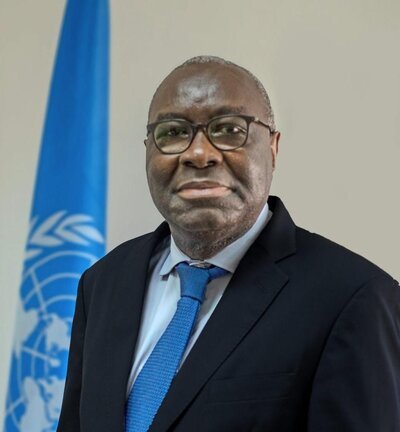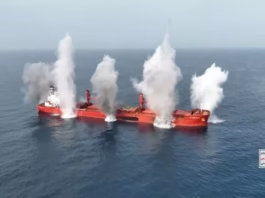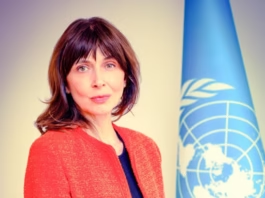Introduction to the Appointment
The recent appointment of Khassim Diagne as the Special Representative and head of the United Nations Peacekeeping Force in Cyprus (UNFICYP) signifies a pivotal moment within the broader framework of UN peacekeeping initiatives. This role is not only crucial for the stability of Cyprus but also reflects the ongoing commitment of the United Nations to uphold peace and security in conflict-affected regions worldwide. Diagne’s leadership is anticipated to bolster the efforts of UNFICYP in managing the complexities inherent in the peacekeeping landscape.
UN peacekeeping missions are essential in providing a neutral presence in areas of conflict, facilitating dialogue between opposing parties, and supporting the implementation of peace agreements. The importance of effective leadership in such missions cannot be overstated, as it directly influences the success of diplomatic efforts and the protection of civilians. Peacekeepers, under the guidance of a capable representative, play a vital role in promoting stability and rebuilding trust among communities torn apart by conflict.
Diagne’s extensive background in diplomatic relations and peacebuilding positions him well to navigate the intricacies of both the Cyprus situation and the broader international context of peacekeeping. His appointment comes at a time when the need for effective negotiation and conflict resolution is increasingly apparent, with various global hotspots requiring immediate attention. As peacekeeping missions evolve to tackle not just military unrest but also humanitarian crises, the leadership provided by figures like Diagne is essential in adapting strategies to meet these diverse challenges.
In today’s climate, where tensions linger in various regions, Khassim Diagne’s role as Special Representative serves as a prominent reminder of the need for proactive and dedicated efforts in peacekeeping operations, paving the way for lasting solutions in Cyprus and beyond.
Khassim Diagne’s Professional Background
Khassim Diagne has built a distinguished career spanning over 25 years in international affairs, particularly within the United Nations system. Prior to his recent appointment as the Special Representative for UN Peacekeeping in Cyprus, Diagne served as the United Nations Resident and Humanitarian Coordinator in Mali. In this role, he was instrumental in coordinating humanitarian efforts in a complex environment marked by conflict and instability, ensuring that aid reached those most in need.
Throughout his career, Diagne has held various significant positions that highlight his extensive expertise in crisis management and conflict resolution. His tenure in the Democratic Republic of the Congo, for example, showcased his ability to navigate multifaceted political landscapes and collaborate with a wide range of stakeholders, including governmental bodies, non-governmental organizations, and local communities. This experience has equipped him with a deep understanding of the dynamics involved in peacekeeping and humanitarian operations.
Moreover, Khassim Diagne has also made valuable contributions to the UN High Commissioner for Refugees, where he rigorously advocated for the rights and protection of refugees and displaced persons. This role further underscored his commitment to international peace and security, as he worked diligently to address the pressing issues faced by vulnerable populations in various regions.
His diverse experiences across multiple countries and contexts have not only honed his negotiation and leadership skills but have also cultivated a profound sense of cultural sensitivity and adaptability. As he embarks on this new chapter in Cyprus, Diagne brings a wealth of knowledge and a proven track record of successful collaboration with local authorities and international partners, positioning him well to make a meaningful impact in his role as Special Representative for UN Peacekeeping.
Impact of Leadership Transition
The transition of leadership from Colin Stewart to Khassim Diagne in the United Nations peacekeeping mission in Cyprus marks a significant moment in the ongoing efforts to maintain stability in this region. Colin Stewart’s tenure was characterized by his commitment to fostering dialogue between conflicting parties, promoting trust-building initiatives, and enhancing community engagement. Stewart’s leadership style was notably collaborative, which earned him respect and gratitude from both the UN Secretary-General António Guterres and the international community. Guterres expressed appreciation for Stewart’s achievements during a challenging period, highlighting his effective communication skills and ability to navigate complex political landscapes.
Leadership transitions in peacekeeping missions can have profound implications on the effectiveness of operations. The incoming leader, in this case, Khassim Diagne, inherits a foundation laid by the previous leadership while also bringing his unique perspectives and strategies to the role. Establishing continuity is essential to maintain momentum in critical areas such as conflict resolution and community relations. Diagne will need to build upon Stewart’s accomplishments while simultaneously addressing new challenges presented by the evolving situation in Cyprus.
As Khassim Diagne assumes his new responsibilities, he will encounter both opportunities and challenges. The integration of innovative approaches to peacekeeping and his capacity to engage with diverse stakeholders could foster a more inclusive environment for dialogue. However, he must also navigate potential resistance from parties accustomed to Stewart’s leadership style. Diagne’s ability to adapt and respond to the dynamics on the ground will be pivotal in sustaining the mission’s objectives and fostering lasting peace in Cyprus. The leadership transition thus presents both a critical juncture and a platform for renewed effort towards international peacekeeping goals.
The Role of the United Nations in Peacekeeping
The United Nations (UN) plays a pivotal role in maintaining international peace and security through its peacekeeping operations. Established to prevent conflict and foster stability, the UN deploys missions worldwide, often in regions plagued by unrest or political instability. Among these missions is the United Nations Peacekeeping Force in Cyprus (UNFICYP), which has been stationed on the island since 1964. This initiative was originally set up to address the intercommunal violence between Greek and Turkish Cypriots and has evolved over the decades as the political landscape has shifted.
The mission in Cyprus faces unique challenges, notably due to the island’s division into two separate administrations, which complicates peacekeeping efforts. The geopolitical implications in the region further complicate this mission, as it occurs within a broader context of regional tensions involving not only Greece and Turkey but also other international stakeholders. Khassim Diagne’s recent appointment as the Special Representative for UN Peacekeeping in Cyprus brings new leadership and perspective to these complex dynamics. His experience in diplomatic relations and conflict resolution will be instrumental in navigating the challenges of this mission.
In order to enhance the effectiveness of peacekeeping operations, cooperation among UN member states is essential. The strategic objectives established by the UN underscore the importance of comprehensive dialogue and collaboration. Peacekeeping is not merely about maintaining a fragile truce; it requires active engagement with local communities and stakeholders to foster a sustainable resolution to conflicts. As Diagne steps into his leadership role, it will be vital for him to prioritize these collaborative efforts, thereby promoting a coordinated approach to peacebuilding in Cyprus and reinforcing the UN’s mission for global peace and security.




